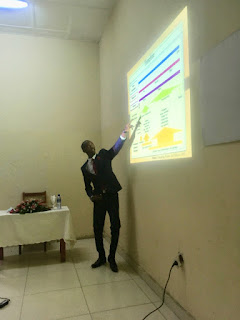 |
| Janvier, my very first thesis student, at his graduation |
One of the most painful and yet ultimately enjoyable tasks that we as doctors do at Kibuye is supervising thesis projects. Just as a recap of the Burundian medical education proces, students attend medical school as a university degree right out of secondary school. They typically spend 6 years in the program—3 as basic science/classroom learners, and 3 as clinical learners. This is where we interact the most with them. They do clinical rotations at Kibuye and we lecture and provide more bedside-type teaching. At the end of all their clinical rotations, students have to sit for a type of oral exam, and then they develop and present a thesis project. This is probably styled like a US PhD sort of setup (albeit at a lower academic level), where the student presents their research and then defends it to a jury of 3 doctors.
Now, some of us doctors are more academically inclined that others in terms of research, but every student needs an advisor for their project, and when there are 50 students and about 10 doctors in the Hope Africa University system, well, we get called upon quite a bit to act as directors. Funny enough, it’s been a steep learning curve. I did some (ok, a) research projects in residency, but there was a team of people to help me out—statisticians, epidemiologists, research interns, and sub-specialized attending doctors. They told me how to design the study, ran all my stats, and helped me interpret the results. I just had to help collect the data, do some background research, and then present the work.
So I’ve now been the thesis director for about 13 students who have graduated, with several more in the works. The process typically begins something like a student approaching me and we have a conversation like,
Student: “Hello doctor. I would like to do a project in Obstetrics and I was hoping you would be my advisor.”
Me: “OK. What did you have in mind?”
Student: “Maybe something with C-sections.”
Me: “That’s very broad. How about something more specific?”
Student: “Maybe indications for C-sections.”
Which, as any researcher out there would know, is not really a research project. Many discussions and emails later, we usually land on a project which may or may not be valid (how would I know? I’m not a researcher). Then the student spends months combing through (or looking for) old charts, reading textbooks and journal articles, and formulating a usually quite large (90-100 page) book. We revise, I ask for p values and then can’t remember how to actually calculate a p value (but I know it’s important) and back and forth we go until the presentation day. This is the more fun part.
 |
| One of our students, Innocent, presenting his data |
What we didn’t realize at the beginning was that after a student defends their thesis project, they actually become a doctor. They take their oath by holding the Burundian flag and from that moment forward, they can practice medicine. It’s not after graduation, like we initially thought. So this presentation day is extremely important (it is understood that the student will pass…if the project would not yet receive a passing score, they would not be allowed to present). Many many friends and family come. Fancy clothes are worn. The room is decorated with flowers and special table cloths and water bottles are set out for the jury.
 |
| Really, we are totally engaged and attentive during the presentation! |
The student presents, the jury asks questions, and then deliberates on the score for 10 minutes or so. Then the student returns and the score is read aloud amidst much clapping. Then the Geneva Declaration is recited by the student as they hold the flag (and sometimes the Bible) and there is much more clapping and many more pictures. And voila. There is another doctor to care for the sick in Burundi.
 |
| Aimable gives his oath |
 |
| Nadia reading the oath |
So after all the work and difficulties and misunderstandings and time, getting to participate in these thesis projects is a culmination of what we have come here to do. Training African medical professionals. Many years ago we started here with the premise “We’re not the best people for this job. Our students are.” On thesis presentation days we start to realize that dream. Hearing a student, no, doctor, recite the oath for the first time is always a little emotional for me. I remember the day I took my own oath, “many years ago” now, on a cloudy May day in California, and remember the privilege and weight of responsibility given to us.
 |
| Christiane, one of our current stage professionels. |
 |
| Our student Bertrand, after finishing his thesis. |
I solemnly pledge to dedicate my life to the service of humanity…
I will maintain the utmost respect for human life…
I will practice my profession with conscience and dignity and in accordance with good medical practice…
I will not use my medical knowledge to violate human rights and civil liberties, even under threat…
I make these promises solemnly, freely, and upon my honor.

No comments:
Post a Comment